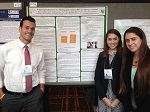
THE MAILMAN CENTER AUDIOLOGY TRAINEES PRESENT THEIR POSTER "PREPARING PROFESSIONALS FOR WORKING WITH CHILDREN WHO ARE MULTIPLY INVOLVED"
06/24/2014

|
The Mailman Center audiology trainees were fortunate enough to present their poster "Preparing Professionals for Working with Children who are Multiply Involved" at the annual Early Hearing Detection and Intervention Conference in Jacksonville in April. The poster focused on the following topic areas: education and training, cultural competence, team approach, legal/ethics, components of the UM LEND program, and testing accommodations. This poster provided information for professors, clinical preceptors, trainees, and current professionals to improve the quality of training in their respective programs. In audiology, for example, improved education in these topic areas is essential due to the co-morbidity of hearing loss and other disabilities. The clinical caseload of health care professionals who work in interdisciplinary settings is likely to include needs that far exceed those of traditional, single-discipline clinics. Moreover, the immigration of families from other countries has increased the importance of cultural competency among professionals. More frequently than before, conflicts may arise between the evidenced-based procedure training promoted by university programs and clinical protocols, cultural perspectives, and ethical priorities of family-centered care. These factors require a more expansive foundation of knowledge and training than those of the past.
Education and training opportunities for professionals working with this population were highlighted. Specifically, a combination of didactic education, problem-based learning, hands on experience, networking, and using experimental learning modules were found to provide professionals with a well-rounded foundation for competently providing services. The consideration of family values and roles, the family's view of disability within their culture, social interaction characteristics (timing, personal space, eye contact, male vs. female clinicians), and using CLAS standards (culturally and linguistically appropriate services) are also of importance. These considerations help build good patient rapport, enhance communication, and increase the likelihood of more positive outcomes. It is essential in these complex cases to use a team approach for evaluation.
Over the last several decades, numerous federal laws have been passed to help protect the civil and educational rights of children with disabilities. In order to provide optimal care to patients, it is vital that clinicians be familiar with the legal landscape of disability care and the potential effects of each law on their profession and the patients they see.
Lastly, the poster explored testing changes and special accommodations for patients. For example, it is essential to cross-check behavioral information with teacher and parental report because behavioral responses may not be as clear as in typically developing children. This poster provides suggestions that can be implemented to help strengthen content in current training programs, and to help produce professionals who are more competent and knowledgeable in providing services to children with a variety of neurodevelopmental disabilities.